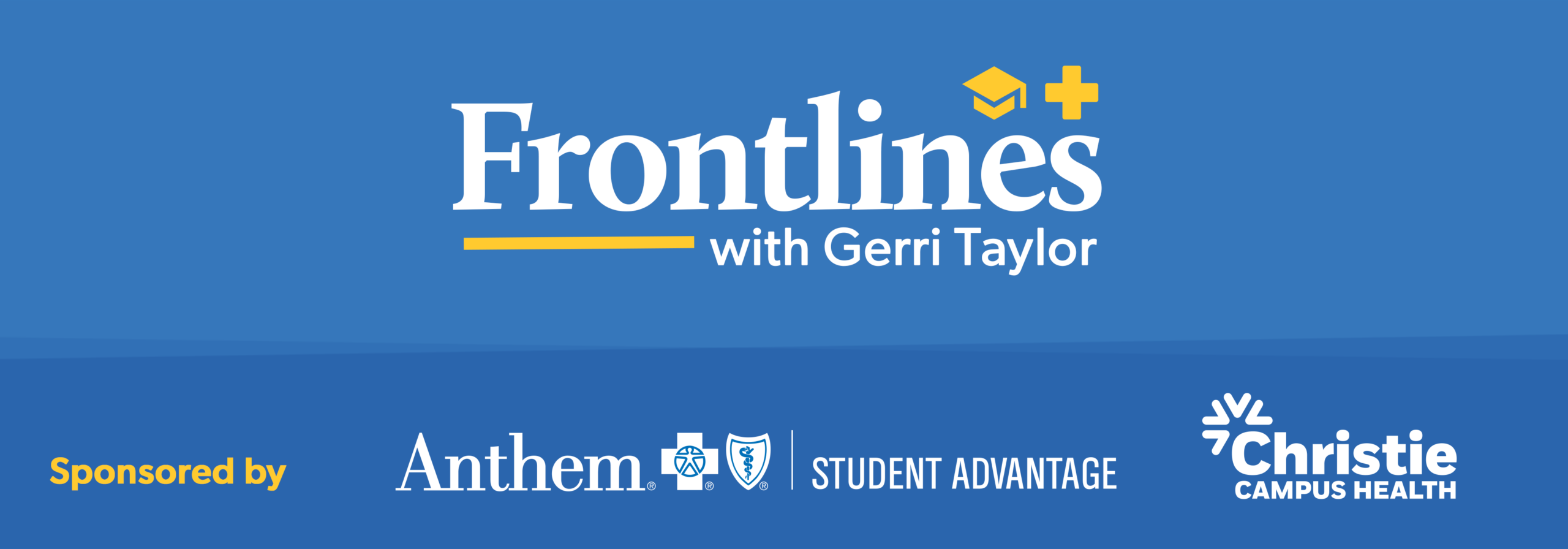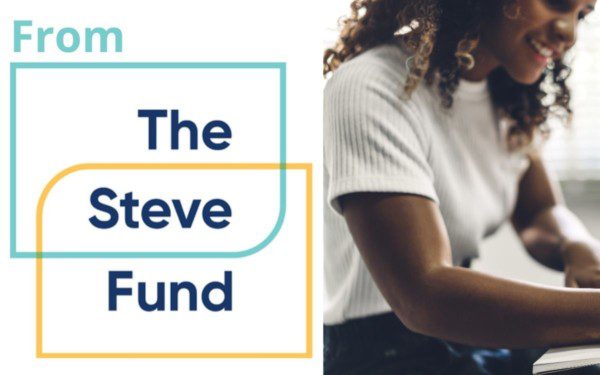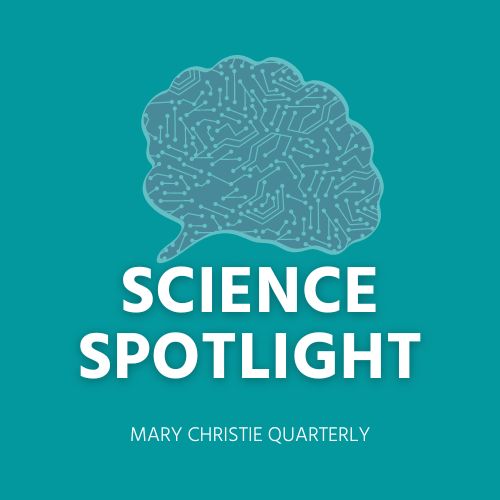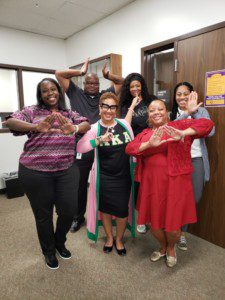
Tondra Moore, PhD, JD, MPH, pictured with colleagues at Prairie View A&M University (PVAMU)
Read about the perspective of college health from a distinguished HBCU college health administrator. Tondra Moore, PhD, JD, MPH has a unique background with degrees combining chemistry, law, public health and health care administration. She currently serves as the Executive Director of Health Services at Prairie View A&M University, an HBCU (Historically Black College and University) in Prairie View, Texas. She is an accomplished administrator who tells us about the physical and mental health challenges which have impacted HBCUs and their students even more so over the COVID pandemic. Her wisdom and experience can help guide us as we improve our services for all students.
Gerri: First, Tondra, I want to offer my deepest condolences on the recent death of your grandmother. I understand that she was an integral part of your life as well as a college professor and an accomplished lady. Was she your role model?
Tondra: I lived with my paternal grandparents and my grandmother had a very large influence on my life and my career. She earned her undergraduate degree from Jackson State University and her master’s degree at Northwestern University. I remember her working on her dissertation, but life got in her way of achieving that goal. When I earned my doctorate, I know that meant so much to her. She was known at Jackson State University as a super nice professor who always had a kind word for her students. I remember many occasions where groups of students would show up to her house with bags of empty Tupperware dishes to fill with her legendary cooking. Just like her, I show love through cooking and more than anything, I want to have a positive impact on the lives of the next generation. She gave me the support to follow my dreams. She taught language and speech and was instrumental in shaping my public speaking ability. In fact, two of her three kids were hard of hearing. Society was not very accommodating for people with disabilities, but she found a way to give her children every opportunity, while still having her own impactful career in education. She empowered her son to pursue his passion for dance, leading him to compete on the national television show, Dance Fever, in the early ‘80s. He could not hear the music, but through speakers lying on the floor he would feel the beat and the music and that’s how he knew where to dance in the song. It was pretty amazing.
Gerri: You truly have some serious resilience in your family. Did you grow up in Jackson, Mississippi?
Tondra: I grew up in Jackson, MS where my mother always put us in situations where we were the minority. We were bussed into predominantly white neighborhoods. I dealt with racism at a very early age. It was difficult because I knew people did not like me, not because of how I behaved or how I was performing, but just because of the color of my skin.
While finally attending a predominantly black high school, I found my safe place and I look back on those years as the best time of my life. I wasn’t looked at differently. I excelled academically and grew personally, because of high expectations for me to excel. The affirmation and encouragement propelled me to graduate first in my class.
When it came to college, I was adamant that I was going to go to a historically Black school. Not everybody was happy about that because they wanted me to attend an ivy. But I didn’t care about Harvard, as it was not an HBC. I grew up in a family of HBCU professors and was fully immersed in the electric atmosphere of Jackson State University. It was the television show, A Different World, that really made me feel a HBCU was the ideal place for me.
I chose Alabama State University in Montgomery, Alabama – they offered me a scholarship. I will be honest – it was not the best scholarship offer I had received. I was heavily recruited, but it was actually their nonchalant approach that appealed to me. Everyone but Alabama State was trying to tell me what I should major in and some were even planning my career and future. In fact, one school wanted me to become a flavor chemist. I was determined to make my own decisions, so I chose Alabama State and it was the best decision I ever made.
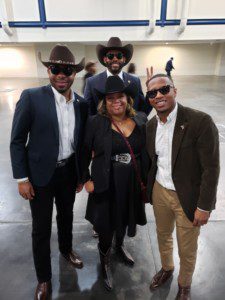
Dr. Tondra Moore with fellow students at PVAMU
Being in an environment where you’re affirmed was so important. Because it was an HBCU, I was going to go to a place where I knew I would be loved and appreciated for who I was and not looked at differently. While at Alabama State University, I majored in chemistry. I suffered a major trauma when my baby brother was killed two weeks before my birthday during the fall of my freshman year. Nevertheless, I pushed on and went on to graduate school at the University of Alabama in Birmingham for my master’s in public health and doctorate in health administration and then went on to law school at Samford at Cumberland School of Law.
I became a member of Delta Sigma Theta Sorority, Inc. and President of the Pan Hellenic Council. If I had the level of counseling and support students have today, I can only imagine how much closer I would be today to achieving my life’s dreams. I grieved the death of my brother. It was not until my first year of graduate school when I took a class called “Death and Dying” that I was able to take the time to work through the loss.
I use my journey when I advise students about their career paths and assure them that it’s okay that it’s not a straight path. I tell them that I was a chemistry major and despite the desires of my family, I knew I was not going to medical school. I decided I did not want to deal with people every day. Instead, I was going to cure AIDS from my lab. But after one summer of prostate cancer research at UAB, that changed. When my mentor asked, “Tondra, what’s the one thing that you learned this summer?” I quickly replied, “I have got to find something else to do because I cannot do this.” I had been working with mice every day for 40 hours a week in the lab and when you know the personality of a mouse, that is too much. I realized then I wanted to work with people.
On my way to work that summer, I walked past the School of Public Health every day and ended up applying for and being accepted into their Health Behavior program. I realized it’s very difficult to tell people that they need to change their behavior when policies are against them. If you don’t have the system set up in a way that people can thrive and succeed, how can you tell them to do things that won’t matter? So, I transitioned into healthcare policy by enrolling in the doctoral Administrative Health Services program, as a Comprehensive Minority Student Predoctoral Fellow. The program was 50% business school, 50% health administration. I majored in health care policy. I quickly realized most policies used either an economics or legal-regulatory perspective. So, that led to law school. You see, it is not always a straight path. The law degree helped refine how I see and develop policy. It also shaped how I teach. It really led the way to how I structure courses and analyze ethical issues.
Gerri: Then why College Health?
Tondra: Graduating from such strong programs in healthcare administration, research, and advocacy provided me with a solid foundation for what I do today. I taught students for almost a decade in healthcare administration programs as an assistant professor, an associate professor, and as department chair. But after some time, I wanted to stay in education, but get out of the classroom. I was teaching other people how to run healthcare facilities, so I knew I could run a student health clinic, and that’s how I ended up here at Prairie View A&M University and have been here since 2018. It’s a good fit for me, but it’s not the last stop. I aspire to be a college president one day.
Gerri: Your experience and education certainly give you a broad background to achieve that goal. In your current administrative position, how do you help students without health insurance get the health care they need?
Tondra: You have to be a tireless advocate. You have to make every dollar count. Some of the HBCUs face financial challenges and struggles with very small budgets. We have so many students that are uninsured and that complicates things further. I’ve had to be a strong advocate for saying how much money I needed and why I needed it. I had to learn the intricate details of higher education funding and development. I also had to realize that when it comes to healthcare insurance, it is a battle we just are not going to win right now, but I continue to advocate. I’m fighting for us to get funds for needed renovations. My building was built in 1974 without any major renovations since that time. The state has a cap on the student health fee, so students pay a health service fee of less than $250 a year with an expectation of having primary and urgent care services provided. At peak enrollment, we have about 9,000 students. You would say that is a pretty robust annual budget, but the cost of providing healthcare quickly shows that it is not enough especially when there are little to no health insurance reimbursements.
Gerri: Can you elaborate on how you serve those students without health insurance?
Tondra: We look at the things that they need the most and try to focus on getting the resources to cover those basic needs. We try our best to keep out-of-pocket costs as low as possible. I insist that we always meticulously search for the most economical price possible and that’s not always easy in this industry. Because health services is considered an auxiliary unit, it is expected to be revenue-generating. Our budget has to fully fund our operations and service delivery. So, a cut in state funding or reduction in enrollment can easily require the need to dip into reserves to make up the difference. Because the cost of healthcare continues to increase, tough decisions are inevitable. Learning to run this unit in a fiscally responsible manner has shown me the value of my education and training. One area that I would teach those in college health is how to really develop an understanding of the more intricate budgeting processes and how to set up budgets. I think that’s where some of our school health professionals across the country fall short, when they don’t fully understand where the money comes from or where it is going, they don’t necessarily make the best business decisions. I have to remind my team that despite our altruistic callings in higher education, we are still a business. If we do not keep our business healthy, ultimately, it hurts the health of the students because then they’re not able to obtain the needed services.
Gerri: If you have an uninsured student who is really sick or needs expensive labs or medication, what do you do?
Tondra: We negotiated low rates with our lab and we can also bill their actual student fee account so they can pay for things incrementally. We do have an emergency resource center, the Hilltop Reserve, which I launched when I came here in 2018. The center includes a food pantry, clothing boutique and emergency resource center. I have a licensed social worker who runs that area and manages the daily operations. The clinic also has a Class D pharmacy and we make it our goal to provide as many medications at as low a cost as we can.
Gerri: Tell me about your health and counseling staff.
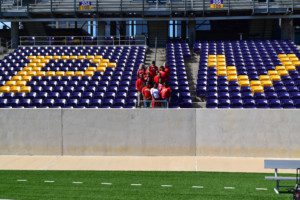
Dr. Moore showcasing school pride with students at PVAMU stadium
Tondra: I have five clinicians in counseling, four medical clinicians and one part-time lab tech in the health area.
Gerri: You wrote a great article recently on burnout – are you seeing burnout in your institution?
Tondra: Yes. My team is pretty tapped out. I do everything that I can to protect them. I continually advocate for them. I’m the person that says ‘no’ even when it is a tough ‘no’ to give. When people come with unrealistic requests and demands on my staff, I remind them that my team is providing care and services to patients and clients. I create a buffer for them. I don’t mind if somebody’s upset with me as long as my team is okay. My team has a reputation for being one of the most productive units in student affairs. We do more programming than any other unit while still delivering excellent care. That’s how I like to operate.
Gerri: What are you seeing in the area of student mental health and have these issues worsened with COVID?
Tondra: I believe that mental health awareness has increased as a result of the pandemic. so students seek help more readily. They may have always needed that help but now they are more inclined to seek it out.
So, I think that level of awareness has really pushed mental health to the forefront. COVID has made higher education leaders acknowledge the issues and dedicate more resources.
Gerri: Are there any specific mental health issues you are seeing at HBCUs?
Tondra: We see anxiety, depression, suicidal thoughts – all of which are seen across the country at other colleges. COVID impacted our students just as they did the majority of other college students. Many still do not understand the students that attend HBCUs are no different than the students in other institutions. There is simply a higher concentration of students with shared cultures, backgrounds, challenges and stressors. But these students are also represented on other campuses just in fewer numbers. I think one of the things that is different for our students, and it’s a plus, is that HBCUs provide a buffer zone for them, so students on campus are not usually dealing with those additional stressors or trauma from microaggressions and racism and social injustice seen on some other campuses. That is one reason I’m an advocate for African American students attending HBCUs for their undergraduate education. HBCUs are known for providing an environment that intentionally fosters a sense of community and family for the students, one that is akin to their personal family.
Gerri: Several recent New York Times articles (https://www.nytimes.com/interactive/2022/06/11/us/howard-campus-hbcu-students.html) (https://www.nytimes.com/2022/06/11/us/hbcu-enrollment-black-students.html) (https://www.nytimes.com/2022/05/13/special-series/families-hbcus-graduates-legacy.html) highlighted the role of HBCUs. One mentioned the pressures on being successful.
Tondra: Yes, there is this expectation that you need to succeed because you have the weight of your ancestors to support. The work that our ancestors did creates an obligation for us to succeed. But honestly, Gerri, many African Americans believe they have to work twice as hard for half the recognition. So, I do not think the article highlighted anything unique. I believe it was just communicated from a larger platform. But with that said, I do believe the one difference is the level of resiliency in this generation versus previous generations. We have some work to do on fortifying this generation’s resiliency because it’s not where it needs to be to face the challenges of life today. Parents have tried so hard to protect students from facing any adversity that when they encounter the first sign of it, they don’t know what to do. It’s like, “Oh, the world is ended.” We have to become that calming voice to show them the world is not ending – you have just reached an obstacle. Now let’s figure out how to overcome it. The ability to see a challenge as an opportunity is not easy for some. I have found that students value my honesty. The world is not going to be easy. My level of honesty and transparency may bother some people, but the same honesty and transparency allow me to see the world as it is and figure out how to excel in it despite all.
Gerri: In the article about burnout, you mentioned a lot about trust. Tell me about that.
Tondra: Well, trust in the African American community with healthcare does not exist for many. Trauma from past mistreatment has been something many have been working to overcome for years. I will be honest, COVID has damaged that trust significantly, especially with African American men. It has been really detrimental, in my opinion, and I think we’re going to see the results of the miscommunication and disinformation in the decades to come. We will be unable to get them to really embrace or just even be accepting of some of the public health mitigation strategies or just healthcare practices in the future.
Gerri: Can you give me an example?
Tondra: Many still believe that COVID was engineered to specifically hurt certain populations, specifically their own. When they hear the stats that are disproportionate in the minority population, some believe we were targeted and COVID was put into these populations. That’s why there has been a disproportionate impact. I constantly have to send factual information to debunk the misinformation.
It is very interesting to look at the magnitude of misinformation and disinformation and how it’s become more viral than the virus. We’re going to focus on strategies to work around it because it’s going to really hurt our community in the long run. Still, with the best data in the world, I have to deal with people not trusting the information because of their lack of trust in the healthcare profession.
Gerri: How are HBCUs gearing up to handle the challenges of the mental health crisis?
I use my journey when I advise students about their career paths and assure them that it’s okay that it’s not a straight path.
Tondra: HBCUs are bastions for training clinicians in providing culturally appropriate counseling specifically for African American populations. One of the things that people often forget is that in mental health and counseling, a relationship has to be established with a foundation of trust. One of the things that researchers found is that racially discordant counseling, when people can’t understand a person’s culture or life experience, cannot be as effective as having culturally sensitive counseling.
And I can specifically speak to that because I’ll never forget, when I went for “executive coaching,” the coach was trying to tell me to change my mannerisms in certain ways. Part of those things actually came from my grandmother, who was a speech professor. One of the things people always notice is that I never need a microphone. I can project my voice. I was brought up by a speech professor. I can’t just change that because I was taught to speak with confidence and authority. To have the executive coach advise me to alter my tone and tenor seemed almost as if she wanted me to remove the confidence and pride I had in who I was as a woman.
So, when students get to our counselors, they see people who understand what it’s like to walk in a world that wants you to look down or look away in one instance, while demanding direct eye contact in another. The students don’t have to explain to our counselors the fear they have when pulled over by law enforcement, because they, too, share those fears. They have that fear for themselves and for their own children, so they get it. There is just a different sense of understanding that helps them build that level of trust. Once they build and establish that trust, students don’t want to go anywhere else.
Gerri: Do you do have adjunctive services in mental health?
Tondra: We have tele-counseling and will add tele-psychiatry in the fall. Due to COVID and some staffing issues, we had a short wait list at the end of last semester. We are proud of our service delivery because we have done a yeoman’s job in meeting the needs of our students while understaffed. We even hosted a big event called the Destress Fest in the spring, an entire day of stress-relieving activities for students with jump houses, water balloons fights, tug of war, meditation, painting and dancing – just anything to help students relax.
Gerri: Is there anything you want to add?
Tondra: Two things:
First, as far as physical health, we have a disproportionate number of students with obesity, but healthcare is going to have to reckon with the conceptualization of health and obesity from a cultural perspective. This generation embraces obesity as body positivity. The famous singer Lizzo and social media influencers have helped change peoples’ views of body image, so on one hand, you’ve got people feeling better about themselves. On the other hand, we still have diabetes, hypertension and heart disease. Healthcare will have to come at it differently than before. We’re going to have to reinvent the way in which we approach this public health issue with this generation.
Secondly, being at an HBCU shapes my thinking around approaches to higher education in general for minority students and students of color. Especially in times like this, when we have such high levels of social unrest and so much strife in our society driven by racism, higher education has to be intentional about creating a culture for all to feel welcome. HBCUs were historically created to provide educational opportunities for individuals who felt as if they were not supported in other environments. Since COVID, HBCUs have seen a marked increase in enrollment and recruitment of talented young minds. I think if more people would start to see HBCUs not as a place where underprivileged students with few options attend, but rather as places bright, young, brilliant minds of people of color choose to learn and grow, they can appreciate the value HBCUs contribute to the landscape of higher education. HBCUs intentionally work to create a very welcoming environment because many who work there remember and know what it feels like not be welcomed in all spaces. I would challenge all institutions of higher learning to identify those things that create a less-than-welcoming environment for all on their campuses and to create an opportunity for change.
Gerri: You said something very important to me early on when you said, “I want to be recognized for being a strong administrator, not the token person of color who can address diversity issues.”
Tondra: There have been many times in my career that I knew I checked boxes for an institution or organization and that was my entry into the space. I am a Black woman who also just happens to be highly educated and trained. But upon my entry into these spaces, I have had to oftentimes remind people that I am not the spokesperson for all Black women, and I do not only care about issues of diversity. I simply want to have my credentials and accomplishments be considered more than my skin color.
Gerri: Tondra – do you have any words of wisdom for students of color?
Tondra: It’s really important right now that students of color take the time to listen to the wisdom from past generations. I say that because the technology age and the internet has made individuals believe that their access to information has given them a greater level of wisdom than their years on earth has provided. The ability to listen should not be earned with harsh lessons in life. Students are uniquely positioned to be in a group where people are surrounding them and wanting to help them be their best and to do better. That was the best thing that I learned as I interned at St. Jude’s Children Research Hospital in Memphis. My mentor, Dr. Lynne Bowers, said, “Tondra, you’re a student. Use that as currency” Glean wisdom from those people who want to give it to you freely – take the time to slow down and listen, really learn those positive things from those people around you and this will stay with you and contribute to your success. And know that your champions will come from all walks of life.
Gerri: That’s awesome, great advice! Such a pleasure listening to your journey and wisdom. Thank you so much for taking the time for this interview – I wish you a wonderful future!

